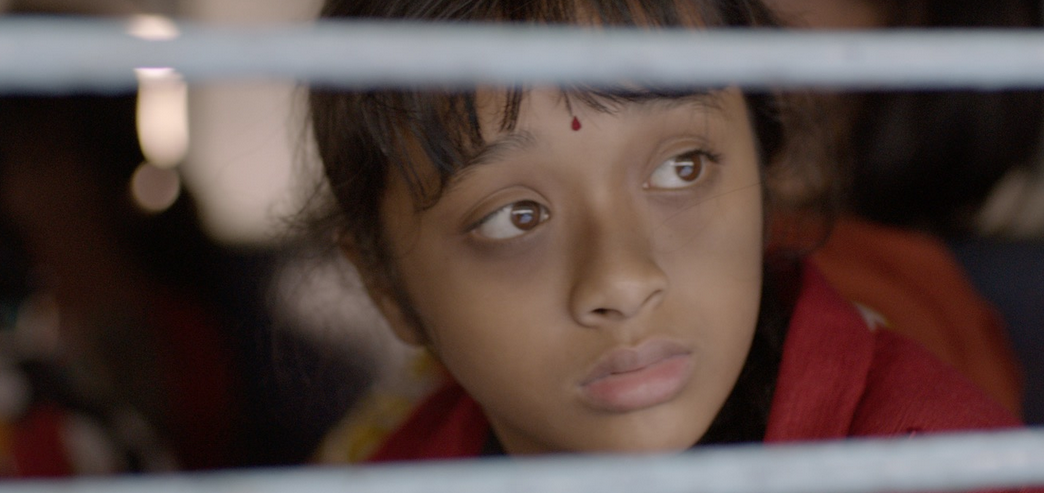By Mal Karman
When Academy Award-winning Mill Valley co-writer-director Jeffrey D. Brown says that making the film SOLD in India changed his life, he doesn’t mean because of the leeches that sucked his blood or the near-death illness that leveled him while shooting.
He’s talking about the 2,000 kids he met there who were trafficked as sex workers as young as age 9.
“One girl had just been rescued in a raid on a Calcutta brothel half an hour before I got to the safe house,” says Brown, whose human trafficking film—based on the bestselling novel by Patricia McCormick—opens on Friday, April 15 at the Rafael. “She had been made to service 10 to 20 men a night. And when you see this kind of fear in a human, it’s like looking at an animal with its back against a wall.”
Most of those children, however, never get out of those places. “It’s essentially a death sentence,” Brown, 59, says. “They are there, maybe five years, and then they get AIDS or they are killed. [For those] who are rescued, someone has to be with them for three months because they are in such a state of fear they will try to kill themselves.”
Brown says that young girls are in demand because virgins fetch a higher price. “Traffickers tell their customers if you have a virgin you’ll have a longer life. So they stitch them up 10 times to fake virginity.
“A lot of them are what they call ‘in the life,’ meaning they’ve been brainwashed and they’re in love with their abuser,” Brown continues. “They believe their pimps actually love them … Even if they escape or are rescued, there is the stigma of being trafficked and their families (who have sold them for $50 or $100) won’t take them back. They are alone.”
So how have visits to numerous brothels half a world away and interacting with such gut-wrenching life stories changed a Marin filmmaker’s life?
“Going into this kind of darkness showed me a lot of light,” Brown says. “Once these children have been rehabilitated, they will risk their lives to save others. These kids have kind of died, but have made it back and they become liberators of others.”
When Brown, who suffered from dysentery while shooting, read McCormick’s book, he felt a calling. “I grew up in Uganda and my stepfather is Bengali, so I saw India firsthand when I was 10,” he says. “It is a place of extremes. You can smell jasmine flowers and open human feces at the same time. You’re bombarded with incredible wealth and incredible poverty. It confronts every belief system you’ve ever had and blows it up so you end up knowing nothing.
“A woman comes out of a cardboard box with three kids, dressed in all these colors and she’s happy and proud, and then in Marin people are living in these amazing houses and they are all stressed out.”
According to Ruchira Gupta, an Indian sex trafficking abolitionist who won the Clinton Global Citizen Award and the Abolitionist Award from the U.K.’s House of Lords, one million new girls a year are forced into sex slavery in India alone, with a total of 6.4 million between the ages of 9 and 18. The average age is 13.
Brown knows of 50 safe houses, each with 200 to 500 kids, who are often there for two or three years because there is nowhere else to put them. He’s partnering with numerous non-governmental organizations (NGOs) that offer vocational training; among them are Project Udaan and Nest.
There is a role for the arts in the effort to end human trafficking, Brown says. The loquacious director, an Oscar winner in 1986 for Best Live Action Short, showed the trailer from SOLD to a United Nations commission on issues facing women. Activists from all over world saw it. “There was excitement that the film was going to be available to them,” Brown says. “It was like we were giving a weapon to a mobilized army.”
Brown pursued the film project for nine years, trying to get as many women involved as he could. He sent it to 12 female directors, none of whom responded, though he did persuade Academy Award-winning actress Emma Thompson to attach her name to it and serve as an executive producer. International humanitarian photographer Lisa Kristine of San Francisco, whose gallery decorates the plaza in Sonoma, visited the set and worked with Gillian Anderson for her role of a photographer trying to gather visual evidence.
The hope is that SOLD will inspire a global movement to address domestic and international human trafficking.
“The courage I saw from these children, their resilience, their kindness and the compassion of those who have managed to come out of those prison brothels, taught me to continue doing what my heart calls me to do,” Brown says. “Allowing the fear, but making your life what you want it to be in spite of it.”
‘SOLD’ opens on Friday, April 15 at the Christopher B. Smith Rafael Center, 1118 Fourth St., San Rafael. Director Jeffrey D. Brown appears in person for the Sunday, April 17 showing at 4:30pm.







What about the lost boys who have to sell survival sex here in the US? That would make a compelling doc.